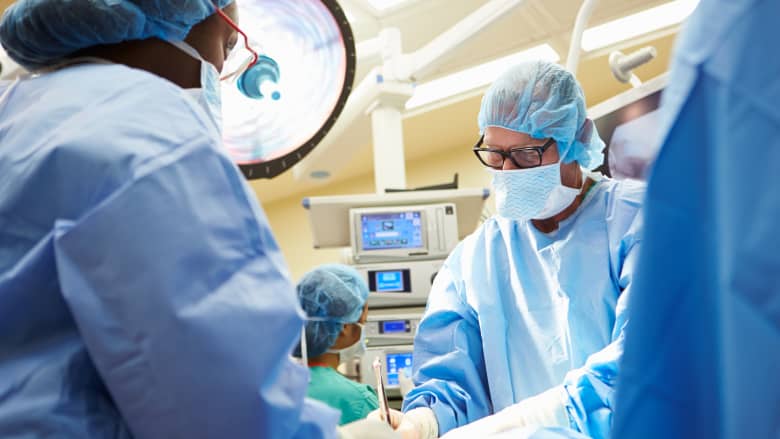Any surgery—even one labeled as “minimally invasive”—is a big deal. The procedure itself may only last a few hours or less, but the recovery process can last weeks or months. If you are preparing for an upcoming shoulder surgery, give some thought to what you may need during your recovery period.

Below is a “must have” list that can help you on your road to recovery.
Items to purchase: equipment for your home, food, and toiletries
A few small pieces of equipment for your home, toiletries, and packaged goods are examples of items you will probably need after surgery. Consider purchasing the items below to help make your recovery process a little smoother.
1. Shower chair. A shower chair can help reduce the risk of falling by allowing you to sit and rest during the showering process. These chairs are helpful after having surgery and taking pain medications, which can tire you out. They are also ideal for people who have accompanying injuries that may make them unsteady on their feet, like a brain injury which can cause dizziness.
2. Detachable shower head. Typically, you’ll have to keep your incision dry for a period of time. A detachable shower head makes it easier to avoid getting your incision wet. It’s also a good idea to cover this area with a plastic bag and tape or a large waterproof bandage.
3. Pump soap. Using soaps in a pump container make the bathing process easier with just one arm.
4. Pillows. Find some extra pillows around your house or purchase one or two. You may find comfort if you prop your injured arm up with a pillow while you’re sitting on your couch or lying in bed.
5. Packaged and frozen food. Fresh is best, but having a few meals available in the freezer can help you in a pinch. Pick up a few frozen meals and a few bags of frozen fruits and vegetables for a quick side dish or snack. Also consider buying ingredients for meals that freeze well, like soups, to make before your surgery.
6. High fiber foods. You may experience constipation after surgery, which is normal. Buy some high-fiber foods at your grocery store to combat this uncomfortable feeling. Here are some examples:
- Oatmeal
- Black beans
- Prunes
- Apples, pears, and baked potatoes with skin
- Broccoli
- Raspberries and blueberries
- Air-popped popcorn
Drinking plenty of water after surgery is another good practice.
7. Laxatives. Consider buying an over-the-counter laxative, such as Metamucil, to help with constipation.
8. Some of your favorite foods. Purchase one or two of your favorite foods, such as a pint of ice cream or a small bag of chips. It’s okay to indulge in moderation.
9. Medicine box. Keep your vitamins and pain and prescription medications organized with a medicine box. You’ll probably be a little groggy after surgery and you want to take the right dose at the right time on the right day.
10. Large waterproof bandages or trash bags and athletic tape. You’ll need to keep your incision covered until your doctor tells you otherwise. This means you’ll have to cover your incision with when you shower to ensure it does not get wet.
11. Toiletries. Load up on things you know you’ll need and the brands you prefer. This helps prevent a friend or spouse tracking down your favorite brand of toothpaste or toilet paper.
12. Wardrobe updates. Getting dressed will be a lot easier if you have shirts that button or zip, instead of ones that pull over your head. Then, make these shirts easily accessible in your closet before surgery. Also, consider buying a pair of supportive shoes that slip on and off or have Velcro straps, since tying your shoes with one hand is no easy feat.
Practical and emotional support
Let’s face it, there are some tasks that are easier to do with two arms. While your shoulder is healing, enlist the help of others to get some things done around the house, like cooking and cleaning. At the same time, having family and good friends nearby can provide the emotional support you may need during your recovery.
13. Have a contact person after surgery. You’ll need someone to drive you home after surgery. If you live alone, make sure you’ve got someone—a friend or relative—lined up to check on you once you return home from the operation. It’s also a good idea to have their contact information just in case you need something.
14. Confirm the help of your spouse, friend, or relative. Identify one or several people to help out around your house and drive you where you need to go for the first few weeks after surgery. You’ll need help with everyday tasks, such as doing laundry, and walking your dog. And until your doctor clears you to drive, you’ll also need someone to drive you to and from physical therapy, as well as any other places you may want or need to go.
15. Ask for company. It can be tough to be sidelined from the sports and activities you enjoy. To help keep your spirits up, ask for visitors. Seeing a familiar face may boost your spirits.
Finally, a positive attitude is something you can’t run out and buy, but is important to have. Recovering from surgery takes time, and you’ll need to be patient. Stay positive, and focus on the small successes you’ve had.

